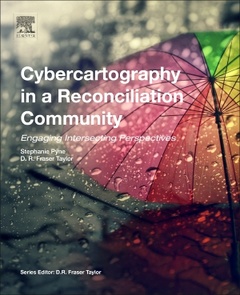Description
Cybercartography in a Reconciliation Community
Engaging Intersecting Perspectives
Modern Cartography Series
Coordinators: Pyne Stephanie, Taylor D. R. Fraser
Language: English
Subjects for Cybercartography in a Reconciliation Community:
Keywords
Archival studies; Archives; Art; Carlisle Indian industrial school; Carlisle Indian school cemetery; Carlisle Indian school digital resource center; Carlisle Indian school outing program; Cartography; Community-based research; Critical cartography; Critical museology; Cybercartographic atlas development; Cybercartography; Design and development; Development; Difficult history; Difficult knowledge; Digital humanities; Emergence; Ethics of care; Heritage sites; Historical geography; Indian boarding schools; Indian residential school; Indian residential schools; Indigenous communities; Indigenous; Institutional ethics; Intercultural relations; Intersectionality; Iterative processes; Local history; Oral history; Participatory ethics; Participatory mapping; Qualitative research; Reconciliation; Reconciliatory museology; Reflexivity; Relational space; Research and education network development; Research and education; Research relationships; Residential schools; Reunion
280 p. · 19x23.3 cm · Paperback
Description
/li>Contents
/li>Readership
/li>Biography
/li>Comment
/li>
Cybercartography in a Reconciliation Community: Engaging Intersecting Perspectives, Volume Eight gathers perspectives on issues related to reconciliation?primarily in a residential / boarding school context?and demonstrates the unifying power of Cybercartography by identifying intersections among different knowledge perspectives. Concerned with understanding approaches toward reconciliation and education, preference is given to reflexivity in research and knowledge dissemination. The positionality aspect of reflexivity is reflected in the chapter contributions concerning various aspects of cybercartographic atlas design and development research, and related activities. In this regard, the book offers theoretical and practical knowledge of collaborative transdisciplinary research through its reflexive assessment of the relationships, processes and knowledge involved in cybercartographic research.
Using, most specifically, the Residential Schools Land Memory Mapping Project for context, Cybercartography in a Reconciliation Community provides a high speed tour through the project?s innovative collaborative approach to mapping institutional material and volunteered geographic information. Exploring Cybercartography through the lens of this atlas project provides for a comprehensive understanding of both Cybercartography and transdisciplinary research, while informing the reader of education and reconciliation initiatives in Canada, the U.S., the U.K. and Italy.
2. Cybercartography, Emergence and Iterative Development: The Residential Schools Land Memory Mapping Project (RSLMMP)
3. Mapping Jeff Thomas Mapping: Exploring the Reflexive Relationship Between Art, Written Narrative and Cybercartography in Commemorating Residential Schools
4. Reimagining Archival Practice and Placed Based History at the Shingwauk Residential Schools Centre
5. The Carlisle Indian Industrial School: Mapping Resources to Support an Important Conversation
6. Charting the Intimate Terrain of Indigenous Boarding Schools in Canada and the United States
7. Workhouses and Residential Schools: From Institutional Models to Museums
8. Talk, Templates and Developing a Geospatial Archives Tradition: Stories in the Making of the Residential Schools Land Memory Atlas
9. Site-based Storytelling, Cybercartographic Mapping and the Assiniboia Indian Residential School Reunion
10. Bridging Institutional and Participatory Ethics: A Rationality of Care Perspective
11. Broadening the Cybercartographic Research and Education Network: From Indian Residential/Boarding Schools to Beltrami and Back Again
12. Conclusion: Building Awareness to Bridge Relationships
- Geographers
- Cartographers
- Archivists
- Historians
- Educators
The book will be useful to cartographers worldwide, as well as individuals engaged in inter-, multi- and trans-disciplinary research, including Canadian, American, North American and Indigenous Studies, and to those interested in the residential schools issue including residential schools survivors.
The book will also be of interest to the general public to the extent that there is interest in learning about new transdisciplinary approaches to cartography, and reconciliation and education efforts in relation to residential schools as well as other areas involving institutional care.
D.R. Fraser Taylor’s combination of experience and expertise in the areas cartography and geographic information, governance, public policy, international affairs, polar issues, Indigenous knowledge and other themes addressed in this volume is unmatched. Professor Taylor’s main research interests are in the application of geospatial information management to the analysis of key socio-economic problems in a national and international context and the presentation of the results in innovative new cartographic forms. He introduced and continues to develop the new paradigm of Cybercartography. His interests in cartography and international development issues are often inter-related. He has extensive field experience in developing nations, especially in Africa. His research interests in this area include: development studies with special reference to Africa, China and Latin America; regional and rural development theory and practice sustainable development and Indigenous development strategies; technology transfer in the field of geomatics; Canada’s international policies in Official Development Assistance; and technology transfer. Current research includes the use of C
- Includes a variety of examples of reconciliation work, especially related to residential / boarding schools, and examines common themes in the issues discussed
- Offers both conceptual and applied dimensions, and provides a good example of a reflexive approach to both research and knowledge dissemination
- Addresses a modern application for Cybercartography that is of considerable societal importance
- Provides historiographical accounts of atlas-making processes, multidisciplinary perspectives on research issues and conceptual explorations



